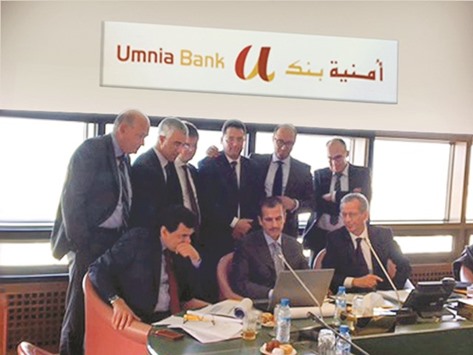The joint venture Islamic bank that has been set up by QIIB and Crédit immobilier et hotelier (CIH) in Morocco will be named ‘Umnia Bank’. It was announced following an ordinary and extraordinary general assembly of the new bank in Casablanca yesterday.
It was also decided to increase Umnia’s capital to 600mn Moroccan dirhams.
The meeting was presided over by QIIB chairman and managing director Sheikh Dr Khalid bin Thani bin Abdullah al-Thani. Ahmed Rahhou, CEO, CIH Bank and Abdulbasit Ahmad al-Shaibei, CEO, QIIB were among those present.
Sheikh Dr Khalid said, “We are closer to formally launching the activities of Umnia Bank. We are very happy to reach this stage, and are hopeful that our new venture will be extremely successful.”
He said the licence for the new JV bank had already been issued by the Central Bank of Morocco.
“Ours was the first licence to be issued in a set of applications for the new Islamic bank in Morocco. Our application was very strong and so are our credentials. We now look to be the best Islamic bank in Morocco,” Sheikh Dr Khalid said.
He said the Moroccan economy remained “very good” and for this reason “it is a good opportunity for us.”
“We are determined to contribute to the Moroccan economy and with a professional team and approach we will do it,” Sheikh Dr Khalid added.
The joint venture in Morocco will be among those pioneering Shariah-compliant Islamic banking in the kingdom.
In 2015, QIIB had signed a joint venture agreement with Morocco’s CIH Bank for the establishment of a bank in the kingdom. This step followed a detailed feasibility study that was conducted by QIIB taking into consideration all factors such as the expected returns on investment and other market factors.
In an earlier interview with Gulf Times, al-Shaibei had said he expected Morocco to be a “launch pad” for QIIB and its joint venture bank in the kingdom.
“We believe Morocco will be our gateway to North Africa. “There is a huge market waiting to be tapped in North Africa, which is in need of Shariah-based, value-driven banking. In Morocco, people are looking for Islamic banking. Morocco can provide us a gateway to this huge market and the kingdom has good relationship with the countries in North Africa,” he said.
Al-Shaibei said with the entry of Islamic banks, more channels would be opened in Morocco.
“There will be new channels for government sukuk…even semi-government projects will be able to tap this new market in non-conventional banking. A lot of people are now outside the system because they can’t do business with conventional banks for religious reasons; they have a clear alternative now. This will add a lot of value to the Moroccan economy”.
Al-Shaibei also emphasised that the new JV bank in Morocco was not in competition with conventional banks. “Purely, we have a complementary role to play,” he said.

Sheikh Dr Khalid, al-Shaibei and Rahhou among others during the ordinary and extraordinary general assembly of Umnia Bank in Casablanca yesterday.
